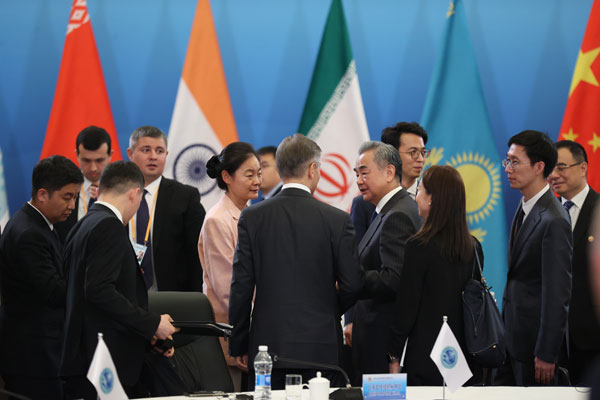
People’s Republic of China

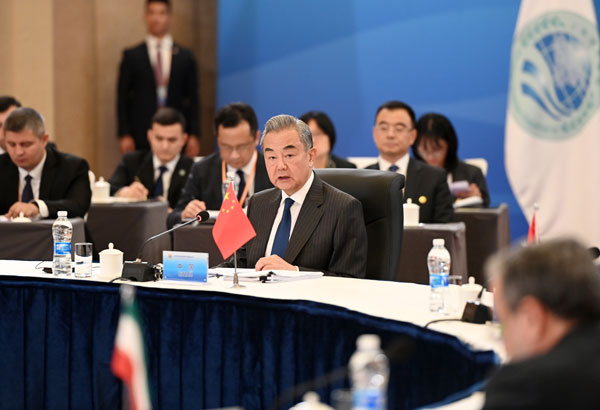
On July 15, 2025, Member of the Political Bureau of the CPC Central Committee and Foreign Minister Wang Yi chaired the Meeting of the Council of the Ministers of Foreign Affairs of the Shanghai Cooperation Organization (SCO) Member States in Tianjin. Attending the meeting were Belarusian Foreign Minister Maxim Ryzhenkov, Indian External Affairs Minister Subrahmanyam Jaishankar, Iranian Foreign Minister Seyed Abbas Araghchi, Kazakh Deputy Prime Minister and Minister of Foreign Affairs Murat Nurtleu, Kyrgyz Minister of Foreign Affairs Jeenbek Kulubaev, Pakistani Deputy Prime Minister and Foreign Minister Mohammad Ishaq Dar, Russian Foreign Minister Sergei Lavrov, Tajik Foreign Minister Sirojiddin Muhriddin, Uzbek Foreign Minister Bakhtiyor Saidov, SCO Secretary-General Nurlan Yermekbayev, and Director of the Executive Committee of the SCO Regional Anti-Terrorist Structure Ularbek Sharsheev.
Wang Yi said that over the past 24 years since its founding, under the strategic guidance of the leaders of member states, the SCO has maintained steady and positive growth, continuously expanded cooperation areas, consistently enhanced its international prestige, and increasingly highlighted its strategic value, becoming a reliable anchor for member states to maintain regional stability and achieve common development.
Wang Yi noted that at present, profound changes unseen in a century unfold at a faster pace, with intertwined and overlapped turbulence and transformation. While a multipolar world and economic globalization continue to deepen and the Global South stands out with a strong momentum. At the same time, hegemonism and power politics run counter to the tide of progress, the countercurrent of protectionism surges, and regional conflicts keep flaring up. Under the new circumstances, member states need to adopt a responsible attitude toward history and the future and reach further consensus on strengthening the SCO.
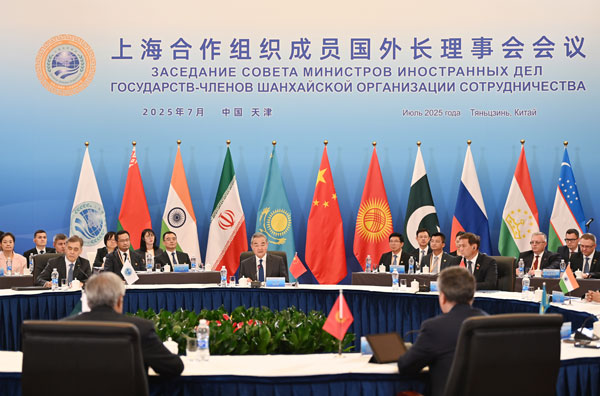
Wang Yi put forward five proposals for the SCO's future development.
First, stay true to its founding mission and carry forward the Shanghai Spirit. The Shanghai Spirit is the very root and soul of the SCO. Mutual trust, mutual benefit, equality, consultation, respect for diversity of civilizations and pursuit of common development illustrate what a new type of international relations should be and the original aspiration of the founding of the SCO. On the new journey ahead, member states need to further champion the Shanghai Spirit, strengthen the SCO's cohesion, action and appeal, take solid steps to perform and excel, and build the SCO into a fine example of mutual respect, fairness and justice, and win-win cooperation.
Second, share weal and woe and consolidate the foundation of security. The "three forces" of terrorism, separatism and extremism continue to stir up troubles in the region, and new threats and challenges keep emerging, making the security situation still complex and severe. The SCO needs to respond effectively. China is deeply concerned about the situation in the Middle East. The use of force against Iran's sovereignty and security is a clear violation of international law and undermines the international nuclear non-proliferation regime. Afghanistan is an important member of the SCO family. Efforts should be made to support Afghanistan's reconstruction and development, and address both symptoms and root causes to realize lasting peace and stability.
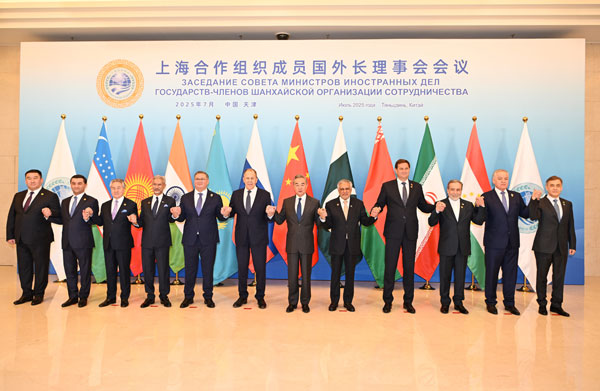
Third, pursue mutual benefit and win-win results to drive the engine of development. Development is of paramount importance and holds the master key to all problems. The SCO should fully tap its potential, strengthen industrial chains, stabilize supply chains, enhance value chains, foster growth drivers in economy, trade, investment, connectivity, scientific and technological innovation, green industries and the digital economy, and achieve sustainable development that leaves no one behind.
Fourth, champion good-neighborliness and jointly build a beautiful home. The neighborhood is the place where countries survive and thrive and the foundation of their development and prosperity. Good neighbors wish each other well. Helping one's neighbors is helping oneself. Good-neighborliness should be a shared commitment of all member states. In April this year, China convened the Central Conference on Work Related to Neighboring Countries and reaffirmed its commitment to seek an amicable, secure and prosperous neighborhood, follow the principles of amity, sincerity, mutual benefit and inclusiveness, and share weal and woe with its neighbors. China is committed to working with neighboring countries to build a peaceful, safe and secure, prosperous, beautiful and amicable home.
Fifth, uphold the right path and defend fairness and justice. A certain country puts its own interests over the international public good, undermining the common interests of the international community. The SCO should take the 80th anniversary of the founding of the United Nations (UN) as an opportunity to firmly uphold the UN's authority and role, advocate for an equal and orderly multipolar world and universally beneficial and inclusive economic globalization, champion the common values of humanity, safeguard the legitimate rights and interests of member states, and work for a more just and equitable global governance system.
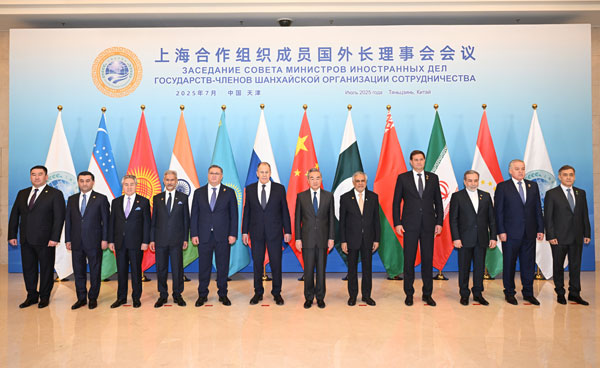
Wang Yi thanked the support of other member states for China's rotating presidency, and expressed the confidence that with joint efforts, the Tianjin Summit will surely be a complete success and the SCO will enter a new stage of high-quality development featuring stronger solidarity, coordination, dynamism and productiveness.
All participating parties highly commended China's excellent work as the rotating presidency and the positive outcomes achieved, and expressed willingness to coordinate and cooperate with China to ensure a successful Tianjin Summit. All parties fully recognized the important role of the SCO in strengthening strategic mutual trust among member states, promoting regional development and prosperity, safeguarding common security and deepening people-to-people ties. All parties agreed that in the face of a turbulent and unstable international situation, it is important to further carry forward the Shanghai Spirit, strengthen solidarity and coordination, safeguard national sovereignty and territorial integrity, combat the "three forces" of terrorism, separatism and extremism, expand cooperation in various fields, promote dialogue among different civilizations, jointly uphold the UN's authority, oppose unilateralism, and resolve hotspot issues through dialogue and negotiation, so as to make new contributions to world peace and development.
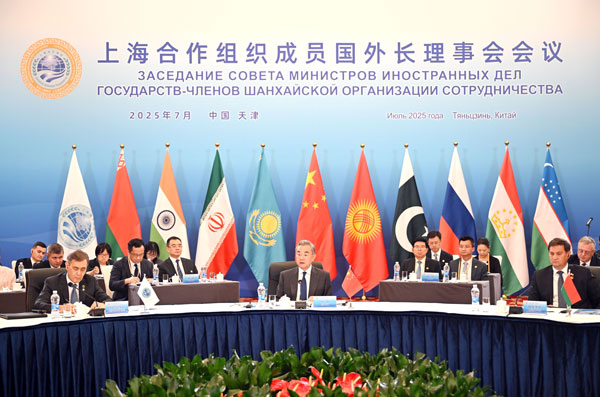
Wang Yi and SCO Secretary-General Nurlan Yermekbayev met the press together after the meeting. Wang Yi announced that the SCO Summit will be held in Tianjin from August 31 to September 1, which is the top priority for China during its presidency. Leaders from more than 20 countries and heads of 10 international organizations will attend the summit and related events.
The meeting made comprehensive preparations for the Tianjin Summit and signed multiple resolutions, including the draft Tianjin Declaration of the Council of Heads of State and the draft SCO Development Strategy for the Next Decade.
